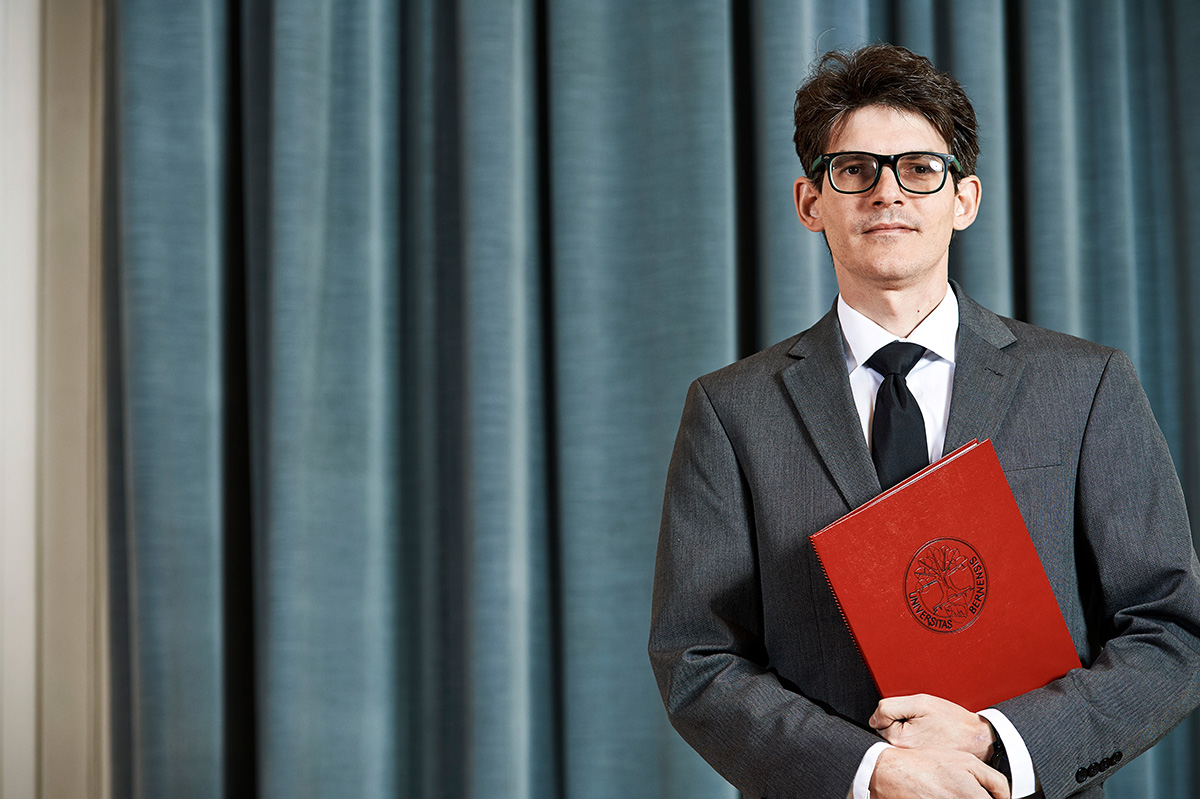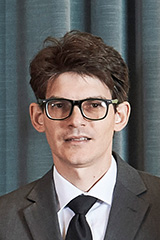Promising approach awarded for combating antibiotic resistance
The University of Bern’s Hans Sigrist Prize, which is endowed with 100,000 Swiss francs, was awarded this year to microbiologist Luciano Marraffini on the occasion of the Dies academicus on Saturday, 5 December. Marraffini was honoured for his innovative research approach in the field of antibiotic resistance. The online magazine “uniaktuell” was able to be on hand during the interview conducted by the Hans Sigrist Foundation with the prize winner.
Antibiotics are used to kill pathogenic bacteria and are jointly responsible for the fact that the average life expectancy of human beings has increased substantially since the first clinical trials in 1941. However, there are an increasing number of pathogens which have become resistant to antibiotics. One of the great challenges of our time is to find a successful method for combating this antibiotic resistance. With his extremely innovative research approach, Luciano Marraffini is among the bearers of hope in this field.
Beat pathogenic bacteria at their own game
Luciano Marraffini already harboured special interest in bacteriology and microbiology in college. As the native Argentinian earned his PhD at the University of Chicago, he attended courses in pathogenesis in order to be able to understand how diseases are caused. The lecturer at the courses had a great influence on Marraffini and eventually became the mentor for his doctoral dissertation in the field of microbiology. Today the 41 year-old Marraffini is assistant professor at Rockefeller University in New York.

Together with his team Marraffini researches bacteria in a laboratory. Bacteria play an important role in the human body, for instance for regulation of intestinal or skin flora; but they can also act as pathogens. In the interview with the Hans Sigrist Foundation, Marraffini explains that on the one hand bacteria are simple organisms, since it concerns single-cell organisms. But on the other hand they are also highly complex, particularly since they can be infected on their part by viruses, so-called “bacteriophages”, or briefly “phages”. Phages can annihilate a bacterial population within a few hours. Marraffini says: “Against these viral infections, bacteria have developed a sophisticated defence system that is similar to the human adaptive immune system, the CRISPR system.”
Marraffini was one of the first people who conducted experiments with this CRISPR (Clustered Regularly Interspaced Short Palindromic Repeats) system. As Marraffini clearly explains in a simplified overview, the CRISPR system functions as follows: initially the virus interacts with the surface of the bacteria and injects genetic material, the virus’ DNA, into the bacterium. The CRISPR system grabs a small part of the viral DNA and stores this information in the CRISPR locus. The bacterium can then utilise this stored information when the same virus injects its DNA again: the CRISPR system triggers an immune response which ultimately brings about the destruction of the viral DNA. This occurs by means of the CRISPR system cleaving the virus’ DNA.
It is this mechanism that shall now be used in the fight against pathogenic bacteria which have become resistant to antibiotics. The objective of Marraffini’s research is to convert the CRISPR system so that it can be used in order to cleave the DNA of resistant pathogens. So the pathogenic, resistant bacteria shall be rendered innocuous.
Promising because it is targeted
Andrea Endimiani, bacteriologist at the University of Bern’s Institute for Infectious Diseases, was the Chair of the commission of national and international experts which nominates researchers for the Hans Sigrist Prize (see the information box below the text). As Endimiani explains, the award is always bestowed upon a middle-aged researcher who has a chance to continue and to intensify his or her research thanks to the prize.
Endimiani praises Luciano Marraffini for the original research approach and emphasises that this was the most promising of those evaluated: “Particularly remarkable is the fact that the CRISPR system, as soon as it has been successfully converted, can operate in an extremely targeted manner. For instance, the entire intestinal flora will not be attacked as is the case with traditional antibiotics but only exactly the bacterium which was foreseen.”

Proximity to practice is decisive
Marraffini came to Bern specifically for the award presentation ceremony. The proximity of the Bern University Hospital to the research institutes at the University of Bern particularly attracted his attention. Marraffini emphasises that the proximity to clinics and real patients is decisive in the field of research with regard to antibiotic resistance. Staphylococci bacteria and in particular MRSA (methicillin-resistant Staphylococcus aureus) – called “hospital pathogens” in colloquial speech – are his special field. These pathogens are resistant to almost all antibiotics, some are event resistant to all antibiotics. It is particularly alarming that such resistant pathogens have also recently spread in facilities such as sports facilities or day care centres. There they are more difficult to cope with than in hospitals, where a decline in pathogens can be achieved with improved hygiene standards.
In conclusion, Marraffini emphasises the importance of the Hans Sigrist Prize for him and his research. Today the trend is increasingly heading towards translational sciences, where applied research is the centre of efforts. But basic research, as he pursues it, is just as important, not only for containment of diseases, but also because it provides decisive findings which flow into the development of new medical technologies.
A detailed version of the interview can be found on the following site after the beginning of January 2016: http://www.sigrist.unibe.ch/news/index_eng.html
Personal details

Luciano Marraffini
Born 1974
1998: University of Rosario, Argentina, Licenciado en Biotecnologia
2002-2007: PhD in Microbiology, University of Chicago, Chicago, Illinois, USA
2008-2010: Postdoctoral studies, Northwestern University, Evanston, Illinois, USA
Since 2010: Assistant Professor, The Rockefeller University, New York, New York, USA
The Hans Sigrist Prize
Prof Dr Marraffini is receiving the Hans Sigrist Prize at the initiative of the Faculty of Medicine. Based on various proposals, the Hans Sigrist Foundation Board always specifies the scientific field from which a commission composed of international experts nominates researchers from at home and abroad. The Foundation Board ultimately decides on the awarding of the prize. The winner can use the prize money at their own discretion within the scope of the research objective.
More information about the Hans Sigrist Foundation
About the author
Brigit Bucher works as the Deputy Manager of Corporate Communication at the University of Bern, and is an editor at “uniaktuell”.